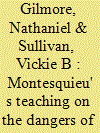| Srl | Item |
| 1 |
ID:
090817


|
|
|
|
|
| Publication |
2009.
|
| Summary/Abstract |
One of the perennial puzzles of Montesquieu's The Spirit of the Laws is whether it has a coherent design. Although the dominant line of thinking is that this work has no unified structure, another believes it to have some organizing principle, even though proposals as to what it may be have failed to convince for lack of ability to account for various features of the work. I propose that The Spirit of the Laws is organized in a dialectical way, juxtaposing the antitheses of human freedom and determination. The tension between these is manifest in the first half of the work and resolved in the middle, and human freedom worked out and advanced in the second half. This article solves the long-standing question of the design of The Spirit of the Laws and reveals that the work's ultimate purpose is to champion human liberty over determination, contrary to the views of those who read the work as deterministic.
|
|
|
|
|
|
|
|
|
|
|
|
|
|
|
|
| 2 |
ID:
154896


|
|
|
|
|
| Summary/Abstract |
Explicitly and implicitly in The Spirit of the Laws, Montesquieu binds together the Japanese who persecute Christians and the Inquisitors of Catholicism who persecute heretics. In seeking purity, both sets of vehement reformers impose atrocious punishments. In so binding the abuses of the East and West together, the work is an expression neither of Orientalism nor of Eurocentrism as conventionally understood. Although Montesquieu thus offers a critical approach to Europe's vulnerability to reformers who go to extremes, whether pious zealots who seek to perpetuate Christianity or zealous Enlightenment philosophes who would seek to eradicate it, many commentators have focused on the work's apparent neutrality with regard to the various cultural phenomena it examines. The key to understanding Montesquieu's reserved tone lies in his commitment to moderation. Given the West's continuing vulnerability to extremism of various types, Montesquieu's moderate teaching on the need for moderation in corrections remains pressingly relevant.
|
|
|
|
|
|
|
|
|
|
|
|
|
|
|
|